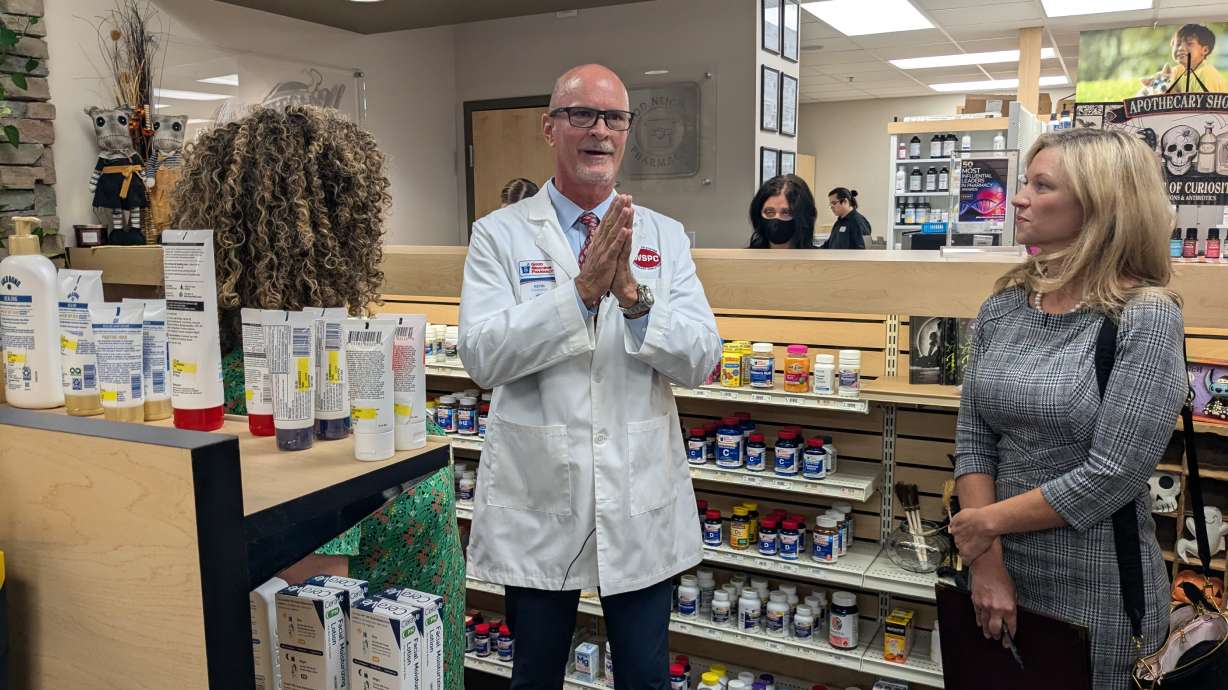Estimated read time: 3-4 minutes
This archived news story is available only for your personal, non-commercial use. Information in the story may be outdated or superseded by additional information. Reading or replaying the story in its archived form does not constitute a republication of the story.
SALT LAKE CITY — Pharmacists from across Utah came together to give a message to lawmakers and heads of government agencies Tuesday morning.
They said they're sick and tired of the high prices of prescription drugs — and they know where the blame lies.
"Every time I see one of my patients not able to afford their medication, walk out of my pharmacy empty-handed ... that's crushing to me," said Kevin DeMass, pharmacist and owner of the Apothecary Shoppe, a family-owned pharmacy in Salt Lake City. "The problem? These PBMs (pharmacy benefit managers). You're being taken advantage of, you're paying too much for your medication and these PBMs are getting rich off of you."
In its simplest terms, pharmacy benefit managers, often referred to as PBMs, are the middlemen between the insurance companies and users of prescription medication. According to the Center for American Progress, which has been analyzing the roles of PBMs for several years, they often negotiate higher prices for the consumer while ingesting any discount along the way. In other words, the PBMs negotiate a high price the patient will pay for medication. Then, instead of providing a cost rebate to the users, they are suspected of keeping that amount themselves.
The higher the drug price for you, the higher the profit for them. And the pharmacists have to go along.
"A lot of times (the PBMs) come with contracts that can't be negotiated and are clearly a problem for the pharmacist and the patient," said Sheldon Burch, from Burch Family Pharmacy in Tooele County. "We are all here because this whole thing does not help the pharmacist or the patient but clearly helps the PBMs."
At The Apothecary Shoppe, U.S. Rep. Celeste Maloy, of Utah's 2nd District, Federal Trade Commission Commissioner Melissa Holyoak and other local commissioners spoke with several pharmacists about this issue. The FTC is currently suing three PBMs — Caremark, Express Scripts and Optum — on the accusation that they inflate the price of insulin, making it unaffordable for those with diabetes, the primary users of the medication.
Holyoak, the former solicitor general for Utah, met with the pharmacists to see up close how they are affected by PBMs and the impact on patients. Along with Maloy and other local commissioners, Holyoak went through the process of filling a prescription and discovering the price of the medication.
"I think there's a lot to learn, and the (FTC) ... is in the middle of a study, trying to understand PBMs and their pricing," said Holyoak, who, as solicitor general, also worked on understanding how PBMs influenced the price of insulin. "There's a lot of opaqueness related to some of this. But, mainly, we want to particularly understand how the consumer is being impacted."
Not much is known by many government agencies about how exactly the PBMs work. As a result, a call for transparency in their processes from pharmacists, patients, family members and even Congress members from both sides of the aisle is being heard by the FTC.
The desire for Democrats and Republicans in Washington — in the tense political climate — to solve the issue is a sign that maybe pharmacists and patients really will see a light at the end of the tunnel when it comes to prescription unaffordability.
"It's not something that's a Republican, Democrat issue," Maloy said. "It's something we just have to fix."
Utah's legislature also has, in recent years, tried to chip away at the issue of unaffordable medications by targeting pharmacy benefit managers — an effort that has so far been unsuccessful.









